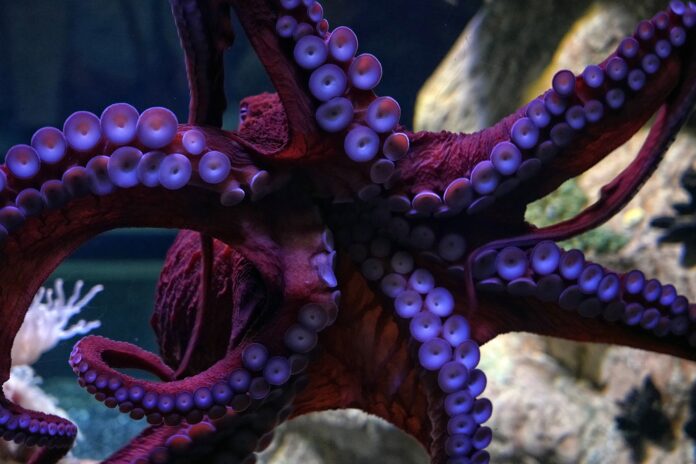This million-dollar question arises amidst the announcement of the first-ever commercial octopus farm has been made. With the increasing advancement of scientific research, the day that we witness a commercial octopus farm is not too far from sight. As every coin has two sides, even the innovations have their share of controversies. The announcement has garnered the disapproval of scientists and conservationists.
Octopus is a very intelligent and sentient being, as it can perceive and respond to sensations of all kinds; i.e. taste, touch, smell, etc. They are included in the invertebrate. They are considered to be less cognitively and behaviorally complex. They are both carnivorous and behaviorally sophisticated. An octopus possesses problem-solving skills, can mimic its surroundings using colour changes, engages in playful activities, and hunts in response to cooperative signals sent by the fishes.
Stacey Tonkin’s part of the job in the Bristol Aquarium of England is to feed a Giant Pacific Octopus, named Davy Jones(known as DJ). She also talks about how DJ is one year old and depicts the behaviour of a teenager. She mentions that he is playful and active one day and grumpy and sleepy the other day.
All these behavioural witnesses are recognized in the UK law through an amendment to the Animal Welfare (sentient) Bill. This change was made after a study by around 300 scientists, which shows that octopuses could feel the emotions, such as happiness, playfulness, also sadness, distress, and pain.
Octopuses are eaten around the world, from Asia to the Mediterranean. In South Korea, octopus is being eaten alive too. This increased consumption has contributed to the decreasing number of octopuses in the wild and also a rise in their price. Many countries were on a quest for the secret to breeding octopuses in captivity. The Spanish multinational, Nueva Pescanova(NP) has announced the marketing of farmed octopuses next year summer, to sell in 2023. The farm will be based inland, close to the port of Las Palmas in the Canary Islands.
An international group of researchers has shown their concern and disagreement against farming. According to them, octopuses are highly territorial and could be damaged easily when kept in captivity.
It’s also believed by the researchers that octopuses are particularly ill-suited to live in captivity and mass production. Farming them is counterproductive from the perspective of environmental sustainability and misguided from a perspective of humane food production. The farming of the carnivorous aquatic creature would increase, and not alleviate the pressure on the wild aquatic animals. Octopuses have a food conversion rate of 3:1, meaning that the weight of food eaten would be three times its weight.
All these concerns and consequences raise the question of whether or not to go ahead with the octopus farm for the breeding of octopuses in captivity.
Do not forget to share in the comments what are your views about Octopus Farming.


